- Home
- Robin Cook
Acceptable Risk Page 4
Acceptable Risk Read online
Page 4
Warned by Reverend Mather, Ronald was neither surprised nor hopeful when he did not see Elizabeth among the first group. The minister had advised him that Elizabeth would be executed last, after the crowd had been satiated on the blood of the first five prisoners. The idea was to lessen the potential impact on the populace, especially those who had either seen or heard of the evidence used against her.
As the wagon drew abreast of Ronald and passed, he gazed up at the faces of the condemned. They all appeared broken and despondent from their brutal treatment and the reality of their imminent fates. He recognized only two people: Rebecca Nurse and Sarah Good. Both were from Salem Village. The others were from neighboring towns. Seeing Rebecca Nurse on the way to her execution and knowing her pious character, Ronald was reminded of Reverend Mather’s grim warning that the Salem witchcraft affair could spiral out of control.
When the wagon reached Essex Street and turned to the west, the crowd surged after it. Standing out in the throng was Reverend Cotton Mather as the only person on horseback.
Almost a half hour later Ronald again heard the telltale sound of metal clanking against the cobblestones of the prison courtyard. Presently a second wagon appeared. In the back sat Elizabeth with her head bowed. Due to the weight of her iron manacles she’d not been able to stand. As the wagon lumbered past Ronald, Elizabeth did not raise her eyes nor did Ronald call out to her. Neither knew what to say.
Ronald followed at a distance, thinking it was like living in a nightmare. He felt great ambivalence about his presence. He wanted to flee and hide from the world, but at the same time he wanted to be with Elizabeth until the end.
Just west of Salem Town, after crossing the Town Bridge, the wagon turned off the main road and began to climb Gallows Hill. The road ascended through a scrub of thornbushes until it opened out onto an inhospitable rocky ridge dotted with a few oaks and locust trees. Elizabeth’s wagon pulled next to the empty first wagon and stopped.
Wiping the sweat from his brow, Ronald stepped from behind the wagons. Ahead he could see the noisy throng of townspeople gathered around one of the larger oak trees. Cotton Mather was behind the crowd and still mounted. At the base of the tree stood the condemned. A black-hooded hangman who’d been brought from Boston had looped a rope over a stout branch. One end he’d tied to the base of the tree while the other he’d fashioned into a noose and fitted over the head of Sarah Good. Sarah Good at that moment was precariously poised on a rung of a ladder leaning against the tree.
Ronald could see Reverend Noyes of the Salem Town Church approach the prisoner. In his hand he clutched a Bible. “Confess, witch!” Reverend Noyes yelled.
“I am no more a witch than you are a wizard,” Sarah yelled back at him. She then cursed the minister, but Ronald could not hear her words for a jeer rose up from the crowd followed by someone yelling for the hangman to get on with it. Obligingly the hangman gave Sarah Good a push, and she swung clear of the ladder.
The crowd cheered and chanted “Die, witch,” as Sarah Good struggled against the strangulating rope. Her face empurpled then blackened. As soon as Sarah’s writhing ended, the hangman proceeded with the others, each in her turn.
With each successive victim, the crowd’s cheering mellowed. By the time the last woman had been pushed from the ladder and the first victims were being cut down, the crowd had lost interest. Although some people had drifted over to see the bodies tossed into a shallow, rocky, common grave, most had already started back toward town, where the revelry would continue.
It was then that Elizabeth was commended to the hangman. He had to help her walk to the ladder due to the excessive weight of her chains.
Ronald swallowed. His legs felt weak. He wanted to cry out in anger. He wanted to beg for mercy. But he did nothing. He could not move.
Reverend Mather, who caught sight of him, rode over. “It is God’s will,” he said. He struggled with his horse, which sensed Ronald’s torment.
Ronald did not take his eyes off Elizabeth. He wanted to rush forward and kill the hangman.
“You must remember what Elizabeth did and what she made,” Reverend Mather said. “You should thank the Lord death hath intervened to save our Zion. Remember you have seen the evidence with your own eyes.”
Ronald managed to nod as he vainly fought to hold back his tears. He’d seen the evidence. Clearly it was the devil’s work. “But why?” Ronald shouted suddenly. “Why Elizabeth?”
For a brief second Ronald saw Elizabeth’s eyes rise to meet his. Her mouth began to move as if she was about to speak, but before she could, the hangman gave her a decisive shove. In contrast to his technique with the others, the hangman had left slack in the rope around Elizabeth’s neck. As she left the ladder, her body fell for several feet before being jerked to a sudden, deathly stop. Unlike the others she did not struggle nor did her face turn black.
Ronald’s head sank into his hands and he wept.
1
* * *
Tuesday,
July 12, 1994
KIMBERLY Stewart glanced at her watch as she went through the turnstile and exited the MBTA subway at Harvard Square in Cambridge, Massachusetts. It was a few minutes before seven P.M. She knew she would be on time or only minutes late, but still she hurried. Pushing through the crowd milling about the news kiosk in the middle of the square, she half ran and half walked the short distance on Massachusetts Avenue before turning right on Holyoke Street.
Pausing to catch her breath in front of the Hasty Pudding Club building, Kimberly glanced up at the structure. She knew about the Harvard social club only in reference to the annual award it gave to an actor and an actress. The building was brick with white trim like most buildings at Harvard. She’d never been inside although it housed a public restaurant called Upstairs at the Pudding. This was to be her first visit.
With her breathing restored to near normal, Kim opened the door and entered only to be confronted by several sizable flights of stairs. By the time she got to the maître d’s podium she was again mildly winded. She asked for the ladies’ room.
While Kim wrestled with her thick, raven hair which refused to do what she wanted it to do, she told herself there was no need to be nervous. After all, Stanton Lewis was family. The problem was that he had never before called at the last minute to say that he “needed” her to come to dinner and that it was an “emergency.”
Giving up on her hair and feeling totally thrown together, Kim again presented herself at the maître d’s podium. This time she announced she was to meet Mr. and Mrs. Stanton Lewis.
“Most of your party is here,” the hostess said.
As Kim followed the hostess through the main part of the restaurant, her anxiety went up a notch. She didn’t like the sound of “party.” She wondered who else would be at the dinner.
The hostess led Kim out onto a trellised terrace that was crowded with diners. Stanton and his wife, Candice, were sitting at a four-top in the corner.
“I’m sorry I’m late,” Kim said as she arrived at the table.
“You’re not late in the slightest,” Stanton said.
He leaped to his feet and enveloped Kim in an extended and demonstrative hug that bent her backwards. It also turned her face a bright red. She had the uncomfortable feeling that everyone on the crowded terrace was watching. Once she was able to break free from Stanton’s bear hug she retreated to the chair held out by the hostess and tried to melt into her seat.
Kim always felt uncomfortably obvious around Stanton. Although they were cousins, Kim thought they were the social antithesis of each other. While she considered herself moderately shy, occasionally even awkward, he was a paragon of confidence: an urbane and aggressively assertive sophisticate. He was built like a ski racer and stood straight and tall, overpowering people as the consummate entrepreneur. Even his wife, Candice, despite her demure smile, made Kim feel socially inept.
Kim hazarded a quick glance around her, and as she did so she inadvertently bumpe
d the hostess, who was attempting to lay Kim’s napkin across her lap. Both apologized simultaneously.
“Relax, cousin,” Stanton said after the hostess had departed. He reached across the table and poured Kim a glass of white wine. “As usual you’re wound up like a banjo wire.”
“Telling me to relax only makes me more nervous,” Kim said. She took a drink of the wine.
“You are a strange one,” Stanton said playfully. “I can never understand why you’re so damn self-conscious, especially sitting here with family in a room full of people you’ll never see again. Let your hair down.”
“I have no control over what my hair chooses to do,” Kim joked. In spite of herself she was beginning to calm down. “As for your inability to understand my unease, it’s entirely understandable. You’re so totally self-assured that it’s impossible for you to imagine what it’s like not to be so.”
“Why not give me a chance to understand?” Stanton said. “I challenge you to explain to me why you are feeling uncomfortable right at this moment. My God, woman, your hand is shaking.”
Kim put down her glass and put her hands in her lap. “I’m nervous mainly because I feel thrown together,” she said. “After your call this evening, I barely had time to take a shower, much less find something to wear. And, if you must know, my bangs are driving me crazy.” Kim blindly tried to adjust the hair over her forehead.
“I think your dress is smashing,” Candice said.
“No doubt about it,” Stanton said. “Kimberly, you look gorgeous.”
Kim laughed. “I’m smart enough to know that provoked compliments are invariably false.”
“Balderdash,” Stanton said. “The irony of this discussion is that you are a sexy, beautiful woman even though you always act as if you haven’t a clue, which, I suppose, is somewhat endearing. How old are you now, twenty-five?”
“Twenty-seven,” Kim said. She tried more of her wine.
“Twenty-seven and improving with each year,” Stanton said. He smiled impishly. “You’ve got cheekbones other women would die for, skin like a baby’s bottom, and a ballerina’s figure, not to mention those emerald eyes that could mesmerize a Greek statue.”
“The truth of the matter is somewhat different,” Kim said. “My facial-bone structure is certainly not exceptional although okay. My skin barely tans if at all, and ‘ballerina’s figure’ sounds like a nice way of saying I’m not stacked.”
“You’re being unfair to yourself,” Candice said.
“I think we should change the subject,” Kim said. “This conversation is not going to get me to relax. In fact it just makes me more uncomfortable.”
“My apologies for being so truthfully complimentary,” Stanton said, his impish smile returning. “What would you prefer we discuss?”
“How about explaining why my presence here at dinner was such an emergency,” Kim said.
“I need your help.” Stanton leaned toward her.
“Me?” Kim questioned. She had to laugh. “The great financier needs my help? Is this a joke?”
“Quite the contrary,” Stanton said. “In a few months I’ll be launching an initial public offering for one of my biotech companies called Genetrix.”
“I’m not investing,” Kim said. “You’ve got the wrong relative.”
It was Stanton’s turn to laugh. “I’m not looking for money,” he said. “No, it’s something quite different. I happened to be talking with Aunt Joyce today and—”
“Oh, no!” Kim interrupted nervously. “What did my mother say now?”
“She just happened to mention that you’d recently broken up with your boyfriend,” Stanton said.
Kim blanched. The unease she’d felt when she’d arrived at the restaurant returned in a rush. “I wish my mother wouldn’t open her big mouth,” she said irritably.
“Joyce didn’t give any gory details,” Stanton said.
“That doesn’t matter,” Kim said. “She’s been giving out personal information about Brian and me since we were teenagers.”
“All she said was that Kinnard wasn’t right for you,” Stanton said. “Which I happen to agree with if he’s forever traipsing off with his friends for ski trips and fishing forays.”
“That sounds like details to me,” Kim moaned. “It’s also an exaggeration. The fishing is something new. The skiing is once a year.”
“To tell you the truth I was hardly listening,” Stanton said. “At least until she asked me if I could find someone more appropriate for you.”
“Good Lord!” Kim said with mounting irritation. “I can’t believe this. She actually asked you to fix me up with someone?”
“It’s not my usual forte,” Stanton said. A self-satisfied smile spread across his face. “But I had a brainstorm. Right after I hung up with Joyce I knew to whom I’d introduce you.”
“Don’t tell me that’s why you got me here tonight,” Kim said with alarm. She felt her pulse quicken. “I never would have come if I’d had any idea—”
“Calm down,” Stanton said. “Don’t get yourself in a dither. It’s going to work out just fine. Trust me.”
“It’s too soon,” Kim said.
“It’s never too soon,” Stanton said. “My motto is, Today is yesterday’s tomorrow.”
“Stanton, you are impossible,” Kim said. “I’m not ready to meet someone. Besides I’m a mess.”
“I already told you that you look terrific,” Stanton said. “Trust me, Edward Armstrong is going to fall for you like a ton of bricks. One look into those emerald eyes and his legs will turn to rubber.”
“This is ridiculous,” Kim complained.
“One thing I should admit right up front is that I have an ulterior motive,” Stanton said. “I’ve been trying to get Edward involved in one of my biotech companies ever since I became a venture capitalist. With Genetrix about to go public, there’s no time like the present. The idea is to get him beholden by introducing him to you, Kim. Then maybe I’ll be able to twist his arm to get him on the Genetrix scientific advisory board. If I get his name on the prospectus it will be worth a good four or five mil on the initial offering. In the process I can make him a millionaire.”
For a moment Kim didn’t say anything as she concentrated on her wine. On top of her anxiety, she was feeling used as well as embarrassed, but she didn’t voice her irritation. She’d always had trouble expressing herself in confrontational situations. Stanton had amazed her as he always had, being so manipulative and self-serving yet so open about it.
“Maybe Edward Armstrong doesn’t want to be a millionaire,” Kim said at length.
“Nonsense,” Stanton said. “Everyone wants to be a millionaire.”
“I know it’s difficult for you to understand,” Kim said. “But not everyone thinks the same way you do.”
“Edward is a nice gentleman,” Candice said.
“That sounds suspiciously like the equivalent of a female blind date being described as having a nice personality.”
Stanton chuckled. “You know, cousin, you might be a mental case but you do have a sense of humor.”
“What I meant to say,” Candice said. “Edward is a considerate person. And I think that’s important. I was initially against the idea of Stanton fixing you up, but then I thought how nice it would be for you to have a relationship with someone civil. After all, the relationship you’ve had with Kinnard has been pretty stormy. I think you deserve better.”
Kim could not believe Candice. She obviously knew nothing about Kinnard, but Kim did not contradict her. Instead Kim said, “The problems between me and Kinnard are as much my fault as his.”
Kim eyed the door. Her pulse was racing. She wished she could just stand up and leave. But she couldn’t. It wasn’t her nature, although at the moment she sincerely wished it were.
“Edward is a lot more than considerate,” Stanton said. “He’s a genius.”
“Oh that’s just great!” Kim said sarcastically. “Not only will Mr. Armstrong fi
nd me unattractive, but he’ll also find me boring. I’m not at my scintillating best when it comes to making conversation with geniuses.”
“Trust me,” Stanton said. “You guys will hit it off. You have common backgrounds. Edward’s an M.D. He was a classmate of mine at Harvard Med. As students we teamed up for a lot of experiments and lab stuff until he took his third year off and got a Ph.D. in biochemistry.”
“Is he a practicing doctor?” Kim asked.
“Nope, research,” Stanton said. “His expertise is the chemistry of the brain, which is a particularly fertile area at present. Right now Edward’s the rising star of the field: a scientific celebrity whom Harvard was able to steal back from Stanford. And speaking of the devil, here he comes now.”
Kim swung around in her seat to see a tall and squarely built yet boyish-appearing man heading for their table. Hearing that he’d been Stanton’s classmate, Kim knew he’d have to be about forty, yet he appeared considerably younger, with straight, sandy blond hair and a broad, unlined, tanned face. There was none of the pallor Kim associated with academics. He was slightly stooped, as if he were afraid he was about to bump his head on an overhead beam.
Stanton was instantly on his feet, clasping Edward in a bear hug with as much enthusiasm as he’d shown Kim. He even pounded Edward’s shoulder several times as some men seem impelled to do.
For a fleeting moment Kim felt sympathy for Edward. She could tell that he was as uncomfortable as she had been with Stanton’s overly demonstrative greeting.
Stanton made brief introductions, and Edward shook hands with Candice and Kim before sitting down. Kim noticed his skin was moist and his grip tentative, just like her own. She also noticed he had a slight stutter as well as a nervous habit of pushing his hair from his forehead.
“I’m terribly sorry for being late,” Edward said. He had a little trouble vocalizing his t’s.

 Shock
Shock Mutation
Mutation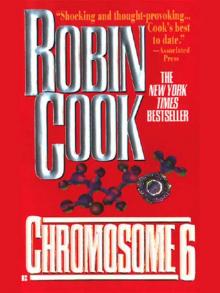 Chromosome 6
Chromosome 6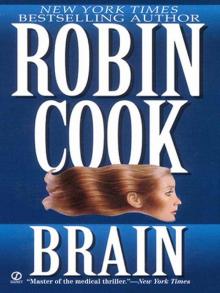 Brain
Brain Intervention
Intervention Invasion
Invasion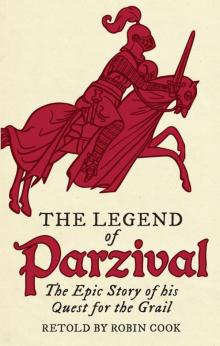 The Legend of Parzival: The Epic Story of His Quest for the Grail
The Legend of Parzival: The Epic Story of His Quest for the Grail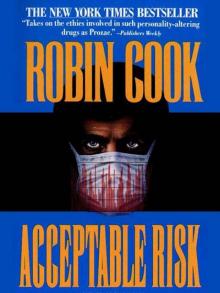 Acceptable Risk
Acceptable Risk Cell
Cell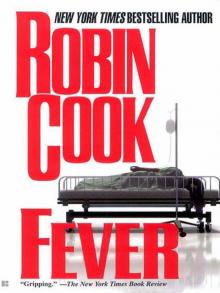 Fever
Fever Death Benefit
Death Benefit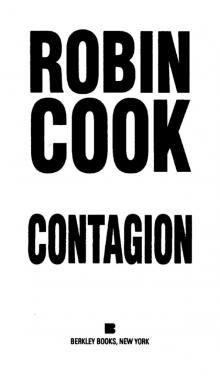 Contagion
Contagion Mindbend
Mindbend Coma
Coma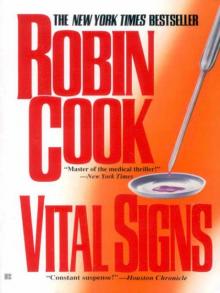 Vital Signs
Vital Signs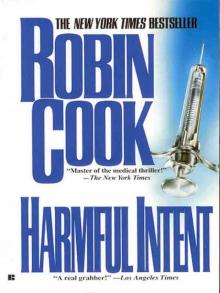 Harmful Intent
Harmful Intent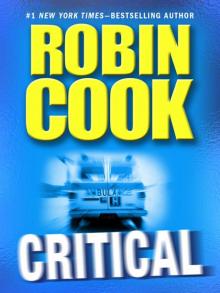 Critical
Critical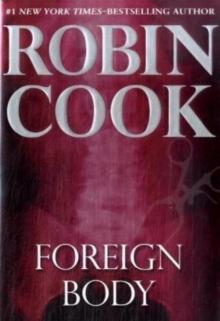 Foreign Body
Foreign Body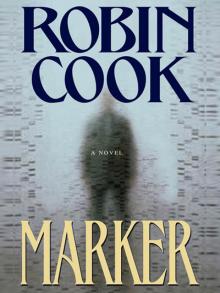 Marker
Marker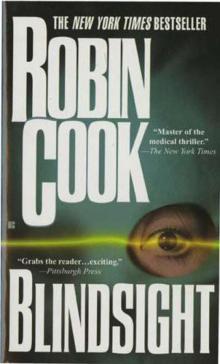 Blindsight
Blindsight Terminal
Terminal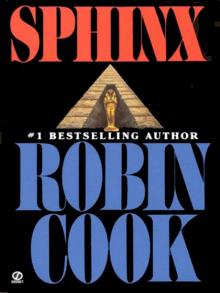 Sphinx
Sphinx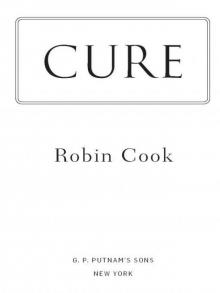 Fatal Cure
Fatal Cure Host
Host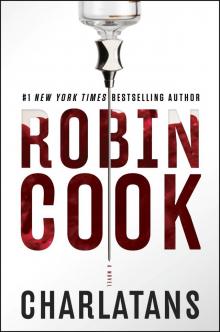 Charlatans
Charlatans Crisis
Crisis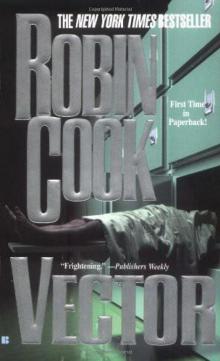 Vector
Vector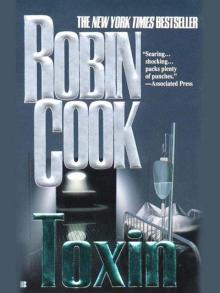 Toxin
Toxin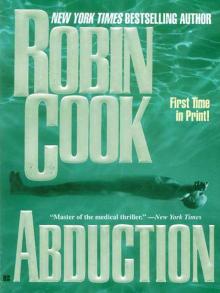 Abduction
Abduction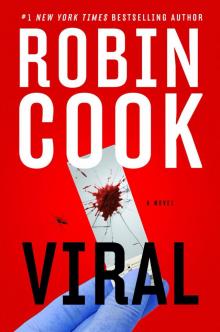 Viral
Viral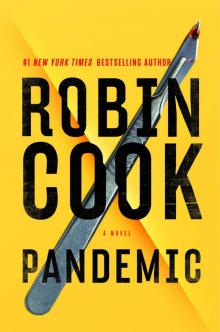 Pandemic
Pandemic Outbreak
Outbreak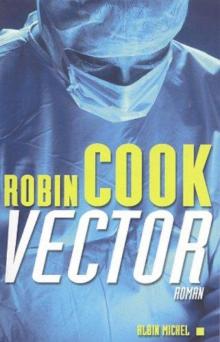 Vector js&lm-4
Vector js&lm-4 Godplayer
Godplayer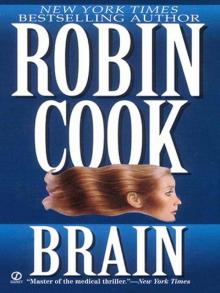 A Brain
A Brain Year of the Intern
Year of the Intern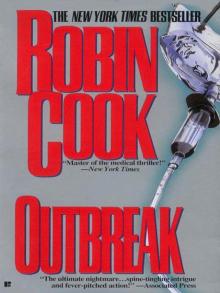 Outbreak dmb-1
Outbreak dmb-1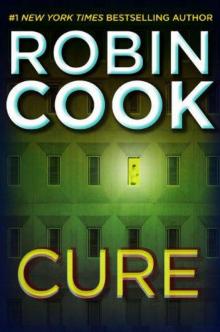 Cure
Cure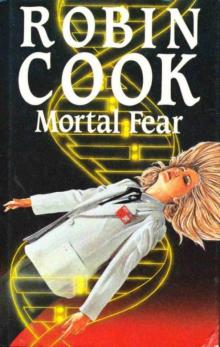 Mortal Fear
Mortal Fear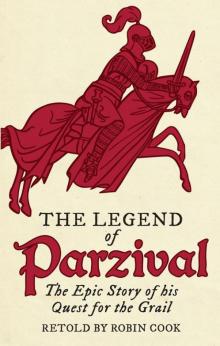 The Legend of Parzival
The Legend of Parzival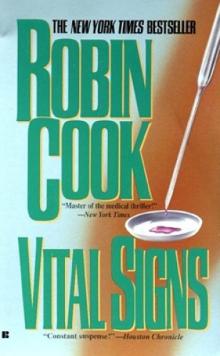 Vital Signs dmb-2
Vital Signs dmb-2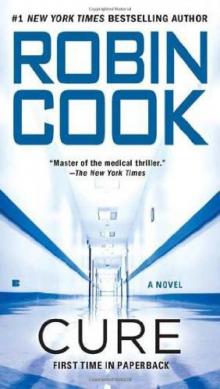 Cure (2010) sam-10
Cure (2010) sam-10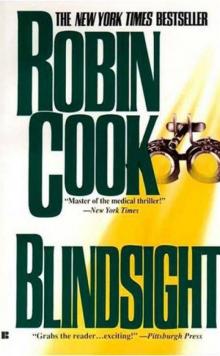 Blindsight sam-1
Blindsight sam-1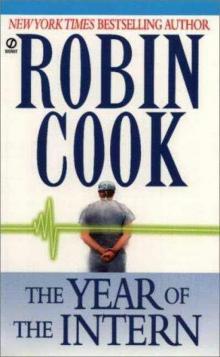 The Year of the Intern
The Year of the Intern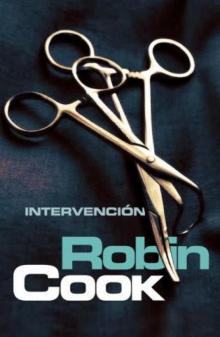 Intervention sam-9
Intervention sam-9 Foreign Body sam-8
Foreign Body sam-8